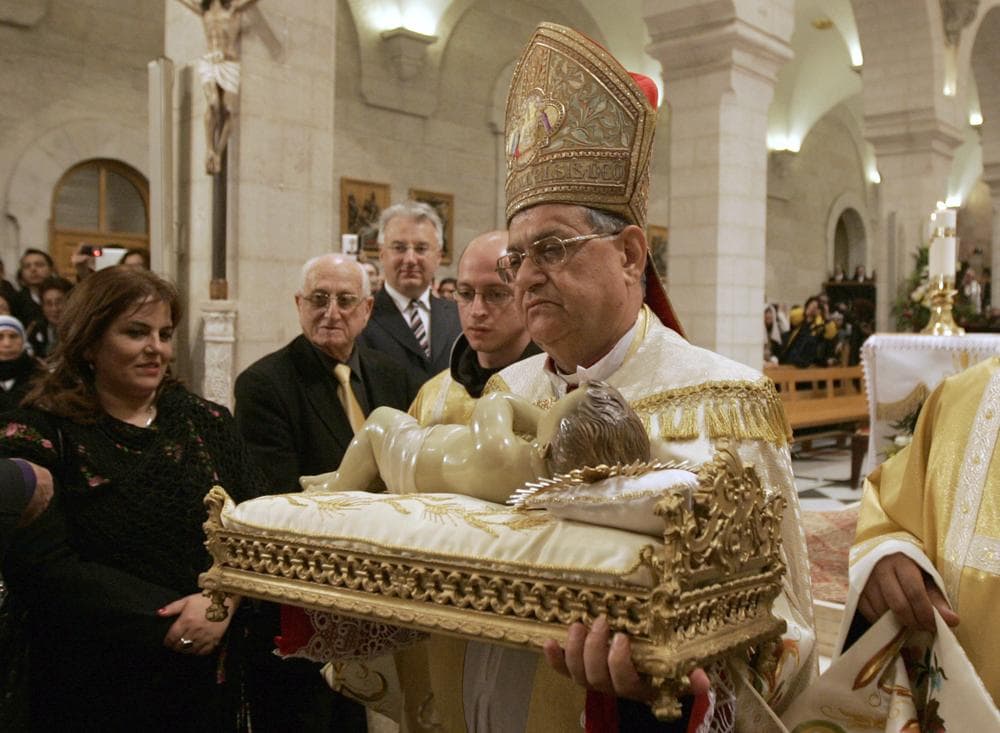Advertisement
Hundreds Pack Bethlehem Church For Christmas Mass

Hundreds of Christian faithful, defying lashing rains and wind, filled the ancient Bethlehem church that marks Jesus' traditional birthplace for Christmas Day Mass on Sunday, even as a blast in a Nigerian church shattered the holiday's message of peace on earth.
Worshippers, dressed in their holiday best and some in the traditional attire of foreign lands, rushed into the Church of the Nativity under the cover of umbrellas, leaving Manger Square, with its 50-foot-tall (15-meter-tall) Christmas tree, deserted. The sanctuary was packed, and the overflow crowd waited eagerly in an arched corridor for a chance to enter.
Inside the bustling church, supplicants raised their voices in prayer, kissed a plaster statue of Baby Jesus and took communion.
"Lots of pilgrims from around the world are coming to be here on Christmas," said Don Moore, 41, a psychology professor from Berkeley, Calif., who came to Bethlehem with his family. "We wanted to be part of the action. This is the place, this is where it all started. It doesn't get any more special than that."
Thousands of miles away near the Nigerian capital, holiday celebrants were not so lucky.
Police had no immediate word on casualties from the blast that ripped through St. Theresa Church in Madalla, and said they didn't know what caused it. The violence came amid a wave of increasingly deadly attacks by a radical Muslim sect bent on implementing strict Shariah law across Nigeria, a nation of more than 160 million people divided into a largely Christian south and a Muslim north.
The holy town of Bethlehem is no stranger to violence, either. Like the rest of the West Bank, it fell on hard times after the Palestinian uprising against Israeli occupation broke out in late 2000. Although civil affairs in the biblical town on Jerusalem's southeastern outskirts are run by Palestinian authorities, security control remains in the hands of Israel, which built a barrier around three sides of the town to keep Palestinian attackers out.
Palestinians say the barrier has badly hurt its economy, which depends heavily on tourism, by severely restricting movement in and out of the town.
But as the violence has subsided, tourists have returned in large numbers. On Saturday, turnout for Christmas Eve festivities in Bethlehem was at its highest since the uprising began driving tourists away. An estimated 100,000 visitors streamed into Manger Square on Christmas Eve, up from 70,000 the previous year, according to the Israeli military's count.
With the barrier looming large over the celebrations in Bethlehem, Palestinians have tried to draw attention to their quest for an independent state with this year's Christmas slogan, "Palestine celebrating hope."
Late Saturday, Palestinian President Mahmoud Abbas told a meeting of Christian leaders that he is committed to reaching peace with Israel.
"I hope they will come back to their senses and understand that we are seekers of peace, not seekers of war or terrorism," said Abbas, a Muslim like most Palestinians. "The mosque, church and synagogue stand side by side in this Holy Land."
Israel had allowed about 500 members of Gaza's tiny Christian minority to travel through its territory to the West Bank to celebrate Christmas in Bethlehem. Most of Gaza's 3,000 Christians belong to the Greek Orthodox denomination, which celebrates Christmas next month.
Later Sunday, the world's Christmas focus will pivot to the Vatican, where Pope Benedict XVI will deliver his traditional "Urbi et Orbi" speech - Latin for "to the city and the world" - from the central loggia of St. Peter's overlooking the piazza.
Usually, the speech is a survey of sorts of the hardships and wars confronting humanity, and ends with the pope delivering Christmas greetings in dozens of languages.
This program aired on December 25, 2011. The audio for this program is not available.